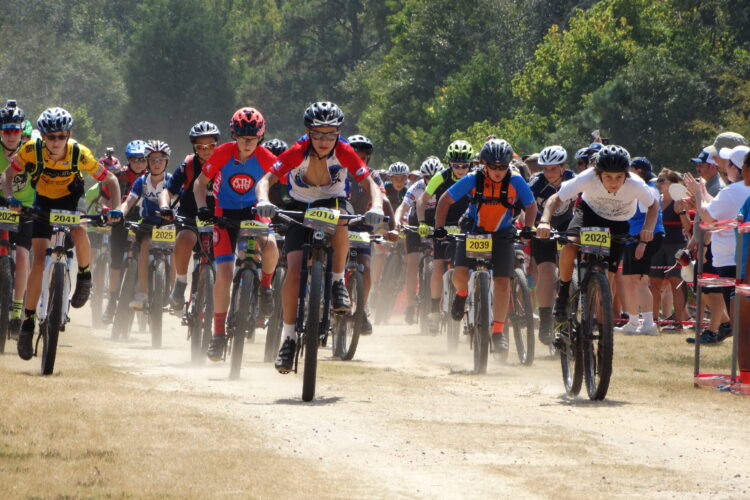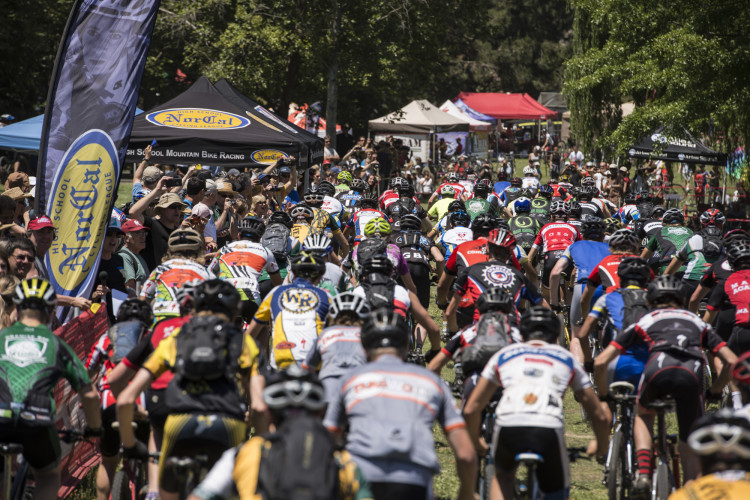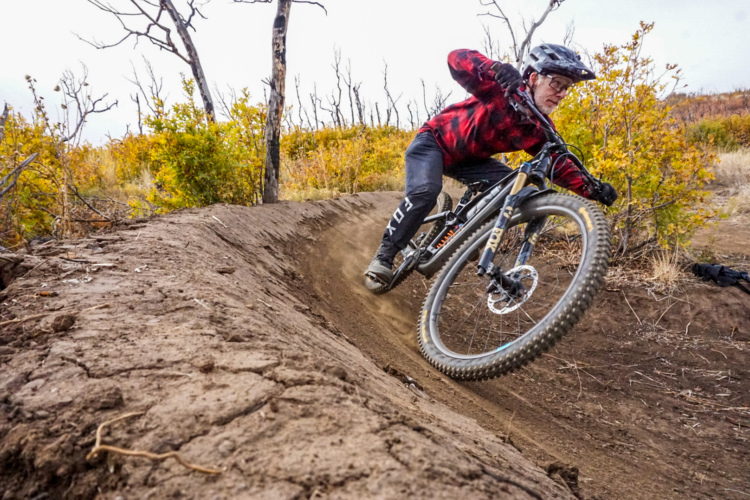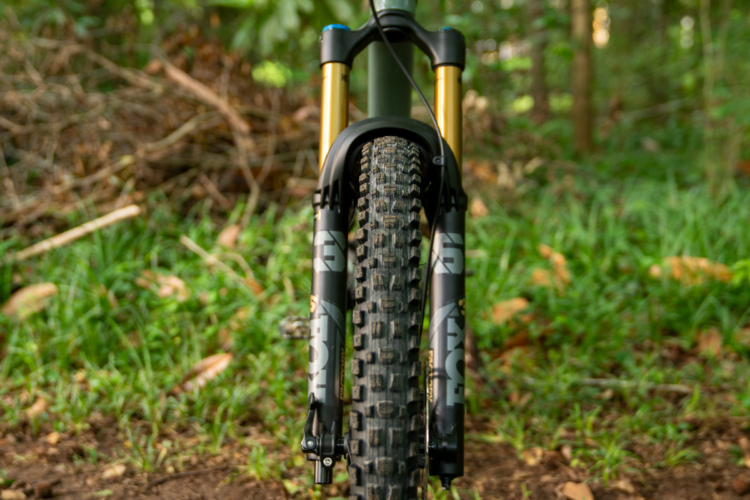
Republican governor of Arkansas, Asa Hutchinson, signed an anti-transgender order into law on March 26, State Senate Bill 354, banning trans girls and women from competing in scholastic sports categories that align with who they are. While the law is focused on school-based sports, this sort of legislation has the potential to impact scholastic cycling, as well as make transgender people feel less welcome in the state. Similar bills were also passed in Tennessee and Mississippi this year.
A surge of energy and cash has been pumped into MTB tourism across Arkansas over the past few years, and many in the local cycling community are not happy about the new law. Proponents say the new law is intended to preserve fairness in women’s sporting events.
BikeNWA Development Director and Arkansas Enduro Series promoter, Candice Kozark, didn’t pull any punches with her thoughts on the new law.
“The Arkansas Enduro Series recognizes and condemns the harm that Arkansas SB-354 and SB-289 do to our trans & LGBTQ+ friends, family, and fellow athletes. Our goal is to create a truly inclusive community. That means that we enthusiastically welcome all trans and LGBTQ+ athletes to participate in our events. We also respect the decision of anyone who declines to participate in our events to protect their physical and emotional wellbeing. We urge all who are able to email or call Governor Hutchinson to express their opposition to these dangerous and harmful bills.”
When these laws take effect they will negatively impact all transgender girls and women from grade school through university in all team sports. We reached out to the president of the National Interscholastic Cycling Association (NICA) president, Steve Matous to understand how the organization, affiliate chapters, and student athletes might be impacted.
Is it the promoter, governing body, school, parents, or the athlete themselves who could be penalized? Unfortunately, Matous doesn’t have a clear answer at this point, though he did say that they plan to support trans athletes.
“NICA has had a transgender policy in place since 2015 that outlines our commitment to providing all students with the opportunity to participate in a manner consistent with their gender identity. For our own continuing education on these issues, in 2020, our staff participated in a mandatory training program, Safe Zone. Developed by the University of North Carolina – Chapel Hill LGBTQ Center, Safe Zone is a training program designed to introduce concepts, terminology, and resources related to sexual orientation, gender identity, and gender expression. We affirm our support for all student-athletes.”
Matous says that NICA is aware of new legislation in several states regarding transgender students’ ability to participate in athletics and that they will be monitoring them.
Oregon-based professional cyclocross racer and transgender athlete Molly Cameron says that the new law is a signal by the state that trans athletes don’t belong there. Cameron has been an advocate and role model for many years in her local community and abroad.
“We are not welcome. Now there are laws saying we are illegal and that we are not welcome to the basic human rights the rest of the citizens of the state are. At this point, you couldn’t pay me to go to Arkansas to do anything other than LGBTQ and BIPOC activism and advocacy.”
USA Cycling is also navigating how the new law will impact their athletes. USAC CEO & President Rob DeMartini said that he’s received a flood of emails from members asking that the organization boycott the coming mountain bike and cyclocross events in the state, though at this point that’s not the way the organization is choosing to respond.
“I just don’t see where that goes. Particularly when this law is in front of twenty different states. I think we need to be part of the dialogue, which in my mind means to participate. It would be different if our athletes were going to be affected, but we don’t believe they will be. There is a question around collegiate athletes if they’re racing for their school. What we’ll probably do is take out any team competition whatsoever and just let them race as individuals. That way we don’t feel like they’re in violation of the law. I know that for some that’s not enough. They want to see [USAC] not send a team and not support the event. The Wal-Mart Foundation is based in Arkansas. It’s [worth] 250 billion dollars. They’re very close to the governor and they are against this bill and couldn’t stop it. So, I’m not sure that a boycott by USA Cycling is anything more than ceremonial. I don’t mean to discount the point of view for a trans athlete. That ceremony may be worth it to them. I just am not sold on that.”
DeMartini is also not yet sure if the mentioned scholastic connection in the legislation will play out in USAC events.
“We’re trying to get some legal guidance. My understanding is that it’s not in violation if it’s not school affiliated. But there’s no safe space there because these laws are going to creep one way or the other based on public opinion in the state. It’s not definitive in the application of the law. I think what is definitive is that this is a bad law. It’s not inclusive. It’s not good for sport of any kind. We object to this kind of law, and we’re going to try to have the influence we can have while keeping our sport open and accessible.”
There is a precedent for allowing transgender athletes to race the category that aligns with who they are in cycling. Following the lead of USAC and the UCI regulations for trans athletes, Kozark added that “What’s also important to note here is that many of us producing cycling events in Arkansas know that though it has been brought to light recently in our state, this is not a new issue in the sport of cycling. There are precedents here for our sport established by other sanctioning bodies. The Arkansas Enduro Series is enacting a transgender policy that will be in line with others across the sport.”
The UCI and USAC have policies in place that require the testosterone levels of athletes who have transitioned from male to female, to be under a certain threshold for at least a year before competing.
Kozark continued, “The ruling is specifically for schools and has no actual authority over what we do in cycling races outside of school-sanctioned events. Since many events in our region are UCI or USA Cycling sanctioned, they most likely will follow their established transgender athlete policies. The NICA league also has an established transgender athlete policy and their local and national leaders are working to figure out what the ruling means for their organization and events here in Arkansas.”
Molly Cameron also said that she doesn’t see a boycott as the best course of action. In terms of what USAC and the local cycling associations can do, she has a clear message: move the race out of Arkansas.
“At this point, they could do more than just making ‘cover your own ass’ statements. The entire cycling industry in Arkansas: the races, tourism community, event promoters, and brands; they are barely doing the minimum in terms of supporting the LGBTQ community in Arkansas. I’m not calling for a boycott. True ally-ship would be if all cycling events in Arkansas would explore moving their events out of state. This follows a precedent set by the NCAA to move events out of states and counties that discriminate against the LGBTQ community.”
Cameron shared some parting words on how this legislation continues the demonization of transgender folks.
“There’s a lot to say about these state and house bills, and Arkansas is not the only state passing discriminatory and racist legislation. The LGBTQ community is not the only community under attack but for Republicans and the right-wing, the transgender community is easy to attack and rally the popular opinion against. In the early 1900s, a conservative narrative was ‘black men are raping our white women’ and now a narrative is ‘trans women are ruining girls sports.’ The reality is that there was and is no black menace and there is no trans menace. There is just fear and ignorance driving these bills across the US.”
For anyone who is wondering what they can do to support transgender athletes, Cameron suggests starting with your voice.
“Speak up. Speak up louder. Be more vocal in your support for the transgender community. A couple of seasons ago a bunch of athletes in New England made patches they pinned to the backs of their kits that said: ‘I stand with trans athletes’ and they wore these in races. That show of support is huge.”











24 Comments
Apr 6, 2021
Personally I think some robust studies need to be done to assess scientifically how much if any advantage a transwoman has physically over non-trans women. Then the female athletes themselves should have a role in deciding whether there should be a separate trans category or whether transwomen and other women should compete on the same playing field. Allowing transwomen to have a separate category would allow them to compete while still assuring other women that they will not be competing at a disadvantage. Ultimately, however, in our politically fractionated country I'm afraid that for the athletes involved the courts and legislatures are going to be the ones who decide.
And in fairness, singletracks editors, perhaps publishing varying viewpoints of some of the female athletes who would be affected by this would add some balance. "In the early 1900s, a conservative narrative was ‘black men are raping our white women’ and now a narrative is ‘trans women are ruining girls sports.’ The reality is that there was and is no black menace and there is no trans menace. There is just fear and ignorance driving these bills across the US.” I find it hard to believe these sentences printed here about what is an issue that reasonable people can have differing opinions about and about which there are valid points to be made by both sides.
Apr 8, 2021
Apr 7, 2021
This has nothing to do with being anti-trans, or even anything to do with any kind of lack of empathy. Of course, transgender takes many forms and manifests in a myriad of ways, but the most common thread is that the self identity doesn't match the physical makeup.
Now here's the crux... athletic competition is a physical activity. Therefore, who you compete against should be based on your physical makeup.
Apr 8, 2021
Apr 8, 2021
Apr 8, 2021
As a sentient writer, I have preferences and biases, and trying to hide them entirely in the name of some unobtainable "balance" would be dishonest. Clearly we can have a lively debate despite any bias in the above article, as you can see in the number of people who disagree with its content. Furthermore, no one who is aligned with the article's bias is commenting about it. Maybe we like a little bias when it agrees with us?
In this case, I am all for transgender girls and women who meet the USAC/UCI/NICA hormone requirements racing in the women's category. As flyingchipmunk put it " Why don’t we just ease off the pressure and let kids be kids and figure out for themselves who they are. Adults obsessing over children’s bodies in the way many of these comments do is pretty gross."
My bias matters even less for the fact that I am neither a transgender woman nor a cisgender woman who will be racing. Aren't those the voices and perspectives that matter here?
Apr 6, 2021
Apr 6, 2021
I don't think that anyone with a Y chromosome should be allowed to participate in women's/girls sports. The definition of women's/girls sports is that you have two X chromosomes.
Apr 8, 2021
Apr 9, 2021
Apr 7, 2021
Apr 7, 2021
Apr 7, 2021
And almost every athlete who competes is also familiar, if not in full agreement, with the adage, “It’s not whether you win or lose, it’s how you play the game.”
Part of the focus with these types of laws and arguments seems to be making sure the right person wins, which to me personally isn’t nearly as important as many of the other positive things we gain from competition (fitness, leadership, teamwork, mental toughness, goal setting, etc.). But I get that there are much more competitive people than me who feel like winning does sit high on the list of the reasons they compete.
We’ve got a cartoon coming up that I captioned (Jerry King illustrates) that pokes fun at the idea of fastest known times (FKTs) in cycling. I love that the phrase is basically a hedge; it’s not that the person in the record book IS the fastest, just the fastest KNOWN. In a sense, even the winner doesn’t get his or her full due, and unlike in many other sports, cyclists are perhaps uniquely ok with that. To my mind, the phrase lets just a little air out of the winner’s inflated ego which I think is pretty beautiful.
I held the school record for a couple of track and field events at my high school in the late 1990s. Do I still hold them? It’s honestly not important enough to me personally to find out the answer. I did my best and carried valuable lessons learned through my entire life, whether I hold the records or not.
Apr 6, 2021
Apr 7, 2021
I wish this were a safe space for trans girls and women to share their perspectives and reactions to this bigoted legislation, but with identically hurtful copy/pasted comments that are on every similar article I would imagine it’s not.
Apr 6, 2021
Having said that, what satisfaction does a trans get in beating a girl/woman?
Apr 7, 2021
Apr 6, 2021
Apr 6, 2021
So what about the ever growing narative that anyone should be able to "identify" as what ever they choose? So one day Labron James can identify as a woman and then start playing in the WNBA? Sound far fetched? Maybe not. Please don't confuse compassion for stating scientific facts. My co worker is a trans Women who I admire very much and she struggles every day with her transition.
Apr 7, 2021
Apr 7, 2021
If you don't have reproductive organs your probably a dude...can we stop playing that game now?
There is no logical debate on this. If you think your a woman ok,if you think your a man ok but biologically you were born a male or a female. Why are we throwing biological sciences out the window? Just to be clear, I couldn't care less how somebody identifies themselves I am simply stating the unfair advantage a trans woman athlete has over a biological woman. If contestants in a sport have no issue with a trans competing with them so be it! Just don't be those folks who ignore science and facts...I won't be responding to any more misinformative replies so you can flame away! Thank you and happy riding.
Apr 8, 2021
Apr 13, 2021
Apr 11, 2021
Trail orgy or a bike race??